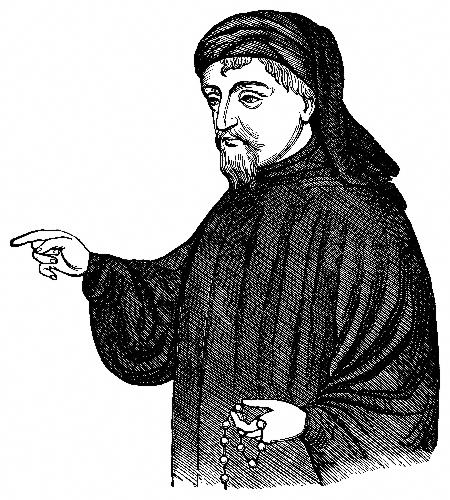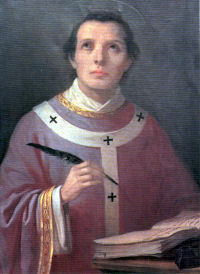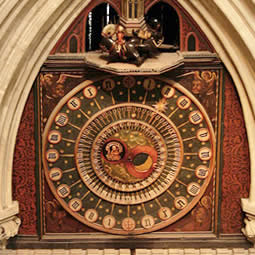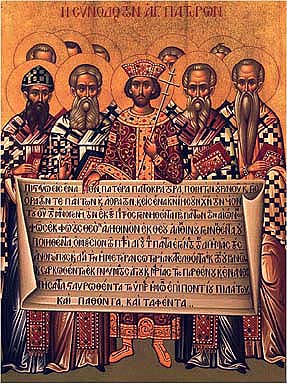The Coronation of Franzen in Venitii
Joan was exhausted.
The ceremonies had been very nicely done, as she expected. It was good to see her friend Franzen crowned. He seemed very pleased with the days events.
But she was exhausted. It was not so much the ceremonies, but the travel to Venitii, being away from her family, and the many issues that needed her attention. Just before the ceremonies she had signed her letter of condolence to the Ottoman.
Thinking of that letter brought Joan's attention back to spiritual issues, those facing Gaul. The people were restless. They wanted something, but knew not what they wanted. Taoism and Islam were practiced in various cities in Gaul, and Christianity was prevalent in many neighboring areas, including here in Venitii. Various advisers and priests had approached her with their thoughts on what would be best for Gaul. How did they know what was best? How did she know what was best? Her mind started racing again, weighing the pros and cons of adopting an official state religion. She just did not know what to do.
Joan took a walk just outside the east gate, where a Christian chapel stood.

She stared up at the chapel, hoping some divine presence would give her the answer. She stared for some time. After an hour, she gave in to her exhaustion. She needed sleep. And she missed her husband and her children.
Joan was exhausted.
The ceremonies had been very nicely done, as she expected. It was good to see her friend Franzen crowned. He seemed very pleased with the days events.
But she was exhausted. It was not so much the ceremonies, but the travel to Venitii, being away from her family, and the many issues that needed her attention. Just before the ceremonies she had signed her letter of condolence to the Ottoman.
Dear Suleiman
It is with great sadness that I heard of the death of your father. I never met him, but I felt I knew him through his deeds, his history, and his friends. He was a great man who accomplished much during his reign. More importantly, he was a spiritual beacon for those who followed the faith of his heart and mind, that of Judaism. Suleiman the Pious will long be remembered, and will long be loved, by his people.
I offer my condolences and those of the Gallic people. May your heart find comfort in the greatness of your father's life.
Sincerely, Joan, Princess of Gaul
It is with great sadness that I heard of the death of your father. I never met him, but I felt I knew him through his deeds, his history, and his friends. He was a great man who accomplished much during his reign. More importantly, he was a spiritual beacon for those who followed the faith of his heart and mind, that of Judaism. Suleiman the Pious will long be remembered, and will long be loved, by his people.
I offer my condolences and those of the Gallic people. May your heart find comfort in the greatness of your father's life.
Sincerely, Joan, Princess of Gaul
Joan took a walk just outside the east gate, where a Christian chapel stood.

She stared up at the chapel, hoping some divine presence would give her the answer. She stared for some time. After an hour, she gave in to her exhaustion. She needed sleep. And she missed her husband and her children.
 Geoffrey Chaucer - Yes, my liege. Our wondrous art, music, literature and philosophy demonstrate the high point of man's achievement. The tanned men working in the fields lift their eyes inspired by the golden domes of the mausoleum. The dusty merchants occupy their time discussing the grand ideas produced in our great library. Our noble families minds are uplifted by the great music and literature produced in our lands. Their lives are enriched by them, and our great achievements give all men something to aspire to.
Geoffrey Chaucer - Yes, my liege. Our wondrous art, music, literature and philosophy demonstrate the high point of man's achievement. The tanned men working in the fields lift their eyes inspired by the golden domes of the mausoleum. The dusty merchants occupy their time discussing the grand ideas produced in our great library. Our noble families minds are uplifted by the great music and literature produced in our lands. Their lives are enriched by them, and our great achievements give all men something to aspire to. Anselm of Canterbury - And when others covet our wealth, what then? Power and wisdom do not go hand in hand.
Anselm of Canterbury - And when others covet our wealth, what then? Power and wisdom do not go hand in hand.  Anselm of Canterbury - Our flesh is destined to rot, our buildings destined to crumble, our great deeds destined to be forgotten. Our spirit though, our soul, that my liege is eternal through Christ. His body was pierced and broken, and died upon that cross, but he rose from the dead! In his sacrifice he conquered sin and liberated all mankind from death. All of us then have eternal life in the kingdom of God. To live for God then is the true path to immortality!
Anselm of Canterbury - Our flesh is destined to rot, our buildings destined to crumble, our great deeds destined to be forgotten. Our spirit though, our soul, that my liege is eternal through Christ. His body was pierced and broken, and died upon that cross, but he rose from the dead! In his sacrifice he conquered sin and liberated all mankind from death. All of us then have eternal life in the kingdom of God. To live for God then is the true path to immortality!  the country. The nation's greatest promoter of the faith, King William, together with
the country. The nation's greatest promoter of the faith, King William, together with  The merchants, a very strong and powerful constituency in the trading, sea-faring nation of England, were very interested in the application of mechanics and machinery in their ships. Great improvements were made to sails, rudders and general construction of ships. Oars, once necessary for propulsion, became less necessary as sails improved. With faster ships, the merchants began trading further and further away and pushed further into uncharted territory. They ran into difficulty however with navigation. As the season advanced, and cloudy nights outnumbered clear, it became impossible to reliably sail and navigate during the winter months.
The merchants, a very strong and powerful constituency in the trading, sea-faring nation of England, were very interested in the application of mechanics and machinery in their ships. Great improvements were made to sails, rudders and general construction of ships. Oars, once necessary for propulsion, became less necessary as sails improved. With faster ships, the merchants began trading further and further away and pushed further into uncharted territory. They ran into difficulty however with navigation. As the season advanced, and cloudy nights outnumbered clear, it became impossible to reliably sail and navigate during the winter months.  With Carthage, Dublin, Glasgow, London and Plymouth solidly won for Christ, England was overwhelmingly a Christian nation. With all the scientific, cultural and infrastructure improvements made under William's golden age, it is this mass conversion his reign would be forever remembered for. The Church had been organized independently before William got the state involved, with leading arch-bishops in Carthage and Dublin. Having been so impressed by Anselm, the bishop of Canterbury, William directed Anselm to be made arch-bishop. Thanks to his patronage, the Archbishop of Canterbury became the head of English Christendom.
With Carthage, Dublin, Glasgow, London and Plymouth solidly won for Christ, England was overwhelmingly a Christian nation. With all the scientific, cultural and infrastructure improvements made under William's golden age, it is this mass conversion his reign would be forever remembered for. The Church had been organized independently before William got the state involved, with leading arch-bishops in Carthage and Dublin. Having been so impressed by Anselm, the bishop of Canterbury, William directed Anselm to be made arch-bishop. Thanks to his patronage, the Archbishop of Canterbury became the head of English Christendom.  William next sought to settle some of the differences that were dividing the early Church. A point of contention throughout the Church has been the nature of the relationship between God the Father, and Jesus the Son. One prominent local bishop, Arius of Arthurton, has been teaching that God the Father created Jesus as the first act of creation, and thus is above and older than Christ. Others argued that the Father and the Son were one, co-extensive and co-equal parts of the same Godhead. London was a world famous center for debate, philosophy and learning. Christian scholasticism was founded there and great scientific advancement was born there. Growing up in this debate and environment, William naturally believed a grand debate and council would solve this dispute.
William next sought to settle some of the differences that were dividing the early Church. A point of contention throughout the Church has been the nature of the relationship between God the Father, and Jesus the Son. One prominent local bishop, Arius of Arthurton, has been teaching that God the Father created Jesus as the first act of creation, and thus is above and older than Christ. Others argued that the Father and the Son were one, co-extensive and co-equal parts of the same Godhead. London was a world famous center for debate, philosophy and learning. Christian scholasticism was founded there and great scientific advancement was born there. Growing up in this debate and environment, William naturally believed a grand debate and council would solve this dispute.


Comment